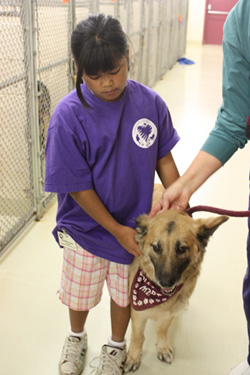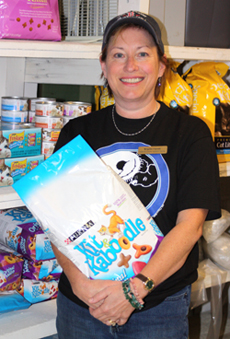 |
|||||
| Politics | Business | Schools | Justice | Health | Et Cetera |
By Laurie White FREDERICK, Md. - Snuffie, a 7-year-old German shepherd mix, has lived in a cage at the Frederick County Animal Control since August, when she was given up by a family who simply wrote “couldn’t afford” on the intake form. She’s an example of what shelter and animal welfare officials say are a growing number of companion animals surrendered for financial reasons during a time of economic crisis and accompanying spikes in home foreclosures and job loss. Maryland has the 16th highest rate of foreclosures in the country, up 118 percent over last year, according to second-quarter reports of RealtyTrac data from the Maryland Department of Housing and Community Development. Foreclosures in Frederick County increased 180.5 percent this year from last, according to the data. Unemployment also rose last year: from 3.6 to 4.6 percent in Maryland and from 2.8 to 3.7 percent in Frederick County between September 2007 and September 2008, according to the Bureau of Labor and Statistics. At Frederick County’s only shelter, pet surrenders are up 10 percent and euthanasia rates are up 18 percent this year over last, said Director Harold Domer. The shelter has a capacity of 241 animals. All of its foster homes are full. Domer calls the increases “unfortunate reality in sheltering in today’s economic times.” He added it is sometimes difficult to track all the numbers of animals surrendered due to economic crises, because people sometimes will not admit to having these problems. “Many times the reason for relinquishing is they had to move or couldn't afford it, those types of things,” Domer said. “Seldom have people said they've been foreclosed on.” Still, Domer said he feels the economy is largely responsible for what he calls an unusual increase in pets being dumped off this year. “The trend in animal sheltering has been pretty much consistent over the past two to three years,” he said. “To have experienced a 10 percent increase in the first three months is unusual.” Bj Altschul, community outreach director for the Montgomery County Humane Society, said the surrenders at the Rockville shelter due to cost, landlord requests or a move are up 10 percent this year, from 467 surrenders between January and October 2007 to 514 from January to Oct. 20, 2008. Surrenders are also on the rise at the Prince George's County Animal Shelter in Forestville, with 1,537 animals given up in September compared to 1,376 in September 2007, an increase of 10 percent. Animal Protection League Exeuctive Director Dr. Lizel Salmon runs the shelter's kennel services and said that although they have not determined the percentage surrendered due to economic pressures, she sees the impact "at the front desk." People call regularly who cannot afford to feed their animals, she said, and surrender them because they are moving into group housing or multi-family living arrangements. She added that individuals frequently surrender ill animals because they cannot afford to pay the veterinary bills. "A tremendous amount of animals are euthanized, particularly if they're ill and the family cannot afford care," she said. The shelter works hard to find new homes for owner-surrendered animals, which have a better chance at adoption because they have been owned before and are less likely to have serious behavior problems, Salmon said. A nonadoptable animal can expect to live 7-10 days in the shelter before euthanization, she said. The shelter is currently over capacity with more than 250 animals needing homes. With more families facing tighter budgets, animal welfare organizations are stepping in to provide some relief for families from the costs of pet ownership. A 2007-08 survey by the American Pet Products Manufacturing Association estimated basic annual expenses for dog ownership run $1,425, and cat ownership $990.
The Frederick County Humane Society provides free pet food from its food pantry to anyone who needs it. Executive Director Brigitte Farrell said she has seen an increase in food requests in recent months.“With the economy the way it is today a lot of families are having a hard time feeding themselves” and their pets, she said. “I used to be able to say we had three [families] in a month” in need of pet food, Farrell said. “Now we get at least three families a week,” she said, an increase she attributes to the organization’s new location in downtown Frederick and to the economic downturn. Families who may have been able to feed their pets previously are now seeking help, including counseling about care options, food and supplies. The Frederick County Humane Society also provides limited financial assistance for veterinary care and other emergency needs. Families living on the edge "can’t afford to feed their animals, so we’re here to help them,” Farrell said. Cheryl Lang, director of the Houston-based No Paws Left Behind and president of Integrated Mortgage Solutions, works from within the lending industry to help prevent pet abandonment. She was motivated to form No Paws Left Behind last year by stories of pets being abandoned in foreclosed properties and the belief that these crises could be averted with a combination of proactive steps and support. “The first thing I encourage people to do is talk to their lender” to work out arrangements that gain time for owners to find homes for the family and their pets, Lang said. Often, she said, people fail to do so because they are embarrassed or afraid. The No Paws Left Behind Web site offers links to no-kill and rescue shelters for people who need to relinquish their pets. It also offers limited funds for emergency situations, although Lang said it’s hard to rely on donations as the economic picture worsens. The Humane Society of the United States has a Foreclosure Project grant program that has distributed $80,000 since June, with $105,000 left to give out to sheltering organizations, including the Kensington, Md.-based NoVa Rottweiler Rescue League, said Nancy Peterson, the society’s feral cat program manager. Peterson suggests that families talk with their veterinarian to determine what essential care is necessary in order to cut costs, and to work with their local shelters to try to find pet-friendly housing in the event of a forced move. “It’s a terrible situation,” she said. “We want people to know, please don’t abandon your pet, call your shelter. They may have an emergency fund.” Farrell said she encourages people to use the Frederick County food pantry monthly if they need to. Previously she suggested quarterly visits. “There are some people who believe that because people don’t have a lot of money they shouldn’t have pets,” Farrell said. “That is just not the case. "For some of these people, this is all they have.”
|
|||||||||
|
Copyright © 2008 University of Maryland Philip Merrill College of Journalism | |||||||||
| Politics | Business | Schools | Justice | Health | Et Cetera | ||||

